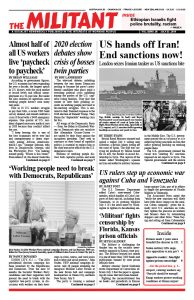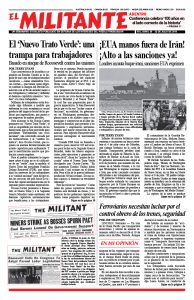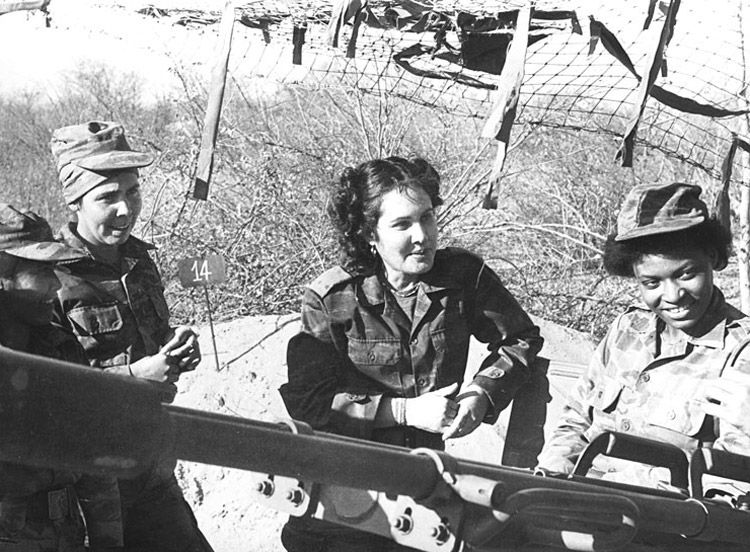The Spanish edition of Cuba & Angola: Fighting for Africa’s Freedom and Our Own by Fidel Castro, Raúl Castro, Nelson Mandela and others is one of Pathfinder’s Books of the Month for July. The talk by Fidel Castro below, was given as he shared a platform with Nelson Mandela for the first time as they both addressed a mass rally in Matanzas, Cuba, July 26, 1991. Mandela, the historic leader of the African National Congress — the revolutionary democratic movement that overthrew apartheid in South Africa — had been released from prison the year before. This excerpt by Castro, commander in chief of the Cuban Revolution, is entitled, “The Most Profound Tribute Ever Paid to Our Internationalist Fighters.” Copyright © 2013 by Pathfinder Press. Reprinted by permission.
It would not be right for us to emphasize Cuba’s modest contribution to the cause of the South African people, but on hearing Mandela’s speech, compañeros, I believe that he paid the greatest and most profound tribute that has ever been paid to our internationalist fighters. I believe that his words will remain, as if they were written in gold letters, as homage to our combatants. He was generous, very generous; he recalled the epic feat our people performed in Africa, where all the spirit of this revolution was manifested, all its heroism and steadfastness.
Fifteen years we spent in Angola! Hundreds upon hundreds of thousands of Cubans went there and thousands more went to other countries. That was the epoch in which imperialism would have given anything to see Cuba withdraw from Angola and end its solidarity with the peoples of Africa. But our firmness was greater than all the pressures and was greater than any benefit our country might have gained had we given in to imperialist demands — as if there could ever be any benefit in abandoning principles and in betrayal.
We are proud of what we have done, and our troops came back from Angola victorious. But who has said this the way he has? Who has expressed it with such honesty, such eloquence? What we have not said, because basic modesty prevented us, he has expressed here with infinite generosity, recalling that our combatants made it possible for the sister republic of Angola to maintain its integrity and achieve peace; that our combatants contributed to the existence of an independent Namibia. He added that our combatants contributed to the struggle of the South African people and of the African National Congress (ANC). He said that the battle of Cuito Cuanavale changed the balance of forces and opened up new possibilities. …
As Mandela was telling you, in this action the revolution staked everything, it staked its own existence, it risked a huge battle against one of the strongest powers located within the Third World, against one of the richest powers, with significant industrial and technological development, armed to the teeth, at such a great distance from our small country and with our own resources, our own arms. We even ran the risk of weakening our defenses, and we did so. We used our ships and ours alone, and we used our equipment to change the relationship of forces, which made success possible in that battle. I’m not aware of any other time when a war broke out at such a distance between so small a country and such a great power as that possessed by the South African racists.
We put all our chips on the table in that action, and it was not the only time. I believe we did the same in 1975, when we took an enormous gamble sending our troops to fight the South African invasion of Angola. …
The truly critical situation occurred in Cuito Cuanavale, where there were no Cubans at the time because the closest Cuban unit was about two hundred kilometers to the west. This brought us to the decision to employ the troops and the weapons necessary — on our own initiative and at our own risk — and to send whatever was necessary, even if it meant taking it from here.
Cuito Cuanavale is the site that became historic, but the operations extended along a line hundreds of kilometers long, and out of these operations a movement of great strategic importance toward southwest Angola developed. All of this is symbolized by the name Cuito Cuanavale, which is where the crisis began; but about forty thousand Cuban and Angolan soldiers with more than five hundred tanks, hundreds of artillery pieces, and about one thousand antiaircraft weapons — the great majority of these antiaircraft weapons of ours were transferred from here — advanced toward Namibia, supported by our air force and an airstrip constructed in a matter of weeks. …
We could have waged big battles there, but given the new situation it was better to resolve the problem of Angola’s integrity and Namibia’s independence at the negotiating table. We knew — how could we not know! — that those events would have a profound effect on the life of South Africa itself, and this was one of the reasons, one of the motives, one of the great incentives that pushed us on. Because we knew that once the problem in Angola was resolved, the forces that were fighting against apartheid would also benefit from our struggles.
Have we said it this way before? No, never, and perhaps we never would have said this, because, in the first place, we believe that above and beyond whatever international solidarity the ANC has had, above and beyond the enormous support from abroad — of public opinion in some cases, of armed action in our case — the decisive and determining factor behind the ANC’s successes was the heroism, the spirit of sacrifice and struggle of the South African people led by the ANC.
This man, in these times of cowardice and so many things, has come to tell us what he told us this afternoon. It is something that can never be forgotten and it reveals the human, moral, and revolutionary dimension of Nelson Mandela.


